The transformation of global energy markets will result in socioeconomic changes in Canada. Engaging Canadian workers and communities in planning for ongoing prosperity and good jobs requires a broad, systems-focused, and coordinated approach.
New Energy Economy Jobs
It's time to put workers and communities at the centre of Canada’s new energy economy.

Growth in clean energy industries will create sustainable jobs
How do we prepare for a changing economy in a way that meets environmental commitments and creates decent jobs? To answer that question we held conversations with workers and experts, examined successes from other countries, and undertook economic modelling to understand how the energy transition could impact workers and the economy by 2050. This summary report condenses findings contained in the Sustainable Jobs Blueprint Part I and Part II.
Read the summary reportResearch and Analysis
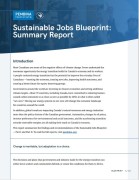
Sustainable Jobs Blueprint: Summary Report
How do we prepare for a changing economy in a way that meets environmental commitments and creates decent jobs?

Clean energy employment is surging globally and it’s time for Canada to join in
Findings from IEA employment report signal need for workforce policy solutions
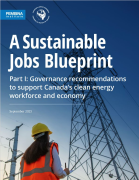
A Sustainable Jobs Blueprint
Part I: Governance recommendations to support Canada’s clean energy workforce and economy
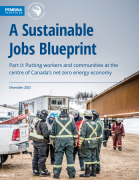
A Sustainable Jobs Blueprint
Part II: Putting workers and communities at the centre of Canada’s net-zero energy economy
What is a sustainable job?
A sustainable job is one that aligns with Canada’s emissions reduction targets and provides good working conditions, decent work standards, such as offering a prevailing or living wage. It is work that delivers carbon emission reductions from an environmental perspective and is high-quality from a labour perspective.
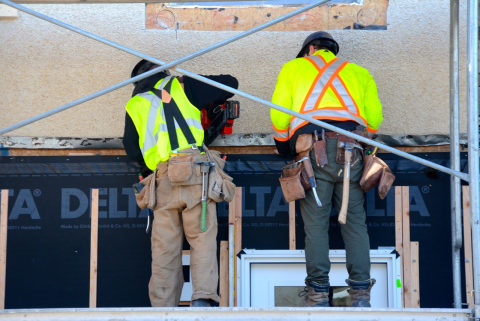
Workers leading the energy transition
How can Canada ready itself for the good clean economy jobs of the future? How can workers benefit in a transition to a net-zero economy? Watch this issue explored by experts from the Canadian Labour Congress, Future Skills Centre, University of Victoria and the Pembina Institute.

What is a net-zero economy?
A net-zero economy continues to deliver goods and services, and a high quality of life, while prioritizing emissions reductions from net-zero and low-cost energy sources. Aligned with Canada’s climate change commitments, this means climate policy and economic policy come together to follow those pathways most likely to help us achieve net-zero emissions by 2050 in a manner that prioritizes affordability and health while growing domestic industries with good-paying jobs.

2 million clean energy jobs by 2050
Our modelling found that the energy transition will result in two million direct and indirect clean energy jobs by 2050. The net-zero policy scenario assumes that Canada achieves a 2030 emissions target of 45% below 2005 levels and net-zero emissions in 2050.
Where are the net-zero economy jobs of 2050?
Our modelling shows that provinces like Alberta, with the highest proportion of jobs in fossil fuel production and use, still experience net job growth in a net-zero scenario—in large part because of growth in employment in manufacturing and services sectors offsetting decreased employment in the oil, gas and construction sectors. (Data source: Navius Research Inc. See A Sustainable Jobs Blueprint: Part II, 2023)
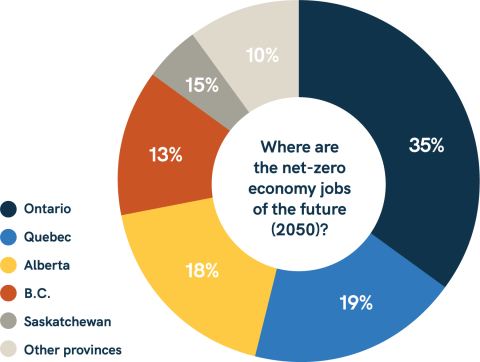
What are the net-zero economy jobs of 2050?
Clean energy jobs could make up approximately 10% of employment in different categories such as electric vehicle supply chain and operations (723,000 jobs), low-carbon buildings (352,000 jobs), carbon capture and storage and direct air capture (253,000 jobs), clean electricity (225,000 jobs) and more. (Data source: Navius Research Inc. See A Sustainable Jobs Blueprint: Part II (2023)
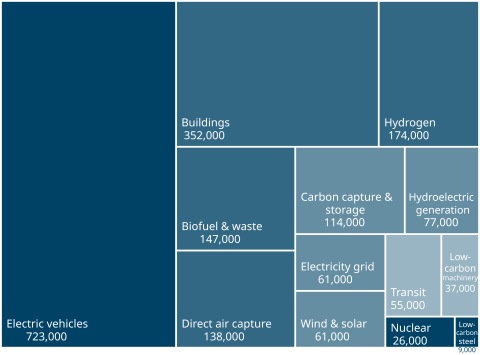
Contact our Equitable Transition team

Manager, Equitable Transition
Megan Gordon
c: 604-245-1408
e: megang@pembina.org
Media Contact
Lejla Latifović (Eastern Time; English)
c: 819-639-4185
e: lejlal@pembina.org
Get our Pembina Perspectives
Pembina Perspectives provides thoughtful, evidence-based research and analysis to support action on climate — in your inbox every two weeks.
We endeavour to protect your confidentiality; read our full privacy policy.

